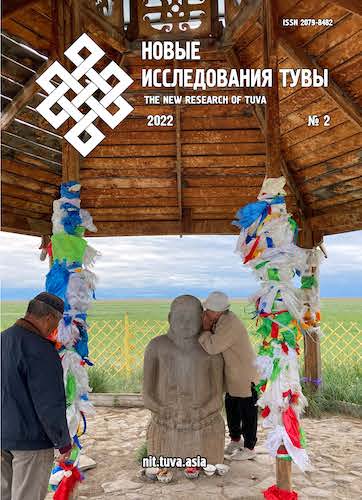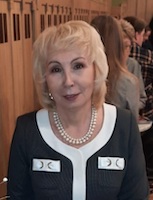Risks in human development in ethnic communities of the Republic of Tuva (1999–2021)
DOI:
https://doi.org/10.25178/nit.2022.2.2Keywords:
human development; social risks; Republic of Tuva; Tuvans; Russians in Tuva; income; social well-being; toleranceAbstract
The article examines how members of ethnic communities of the Republic of Tuva assess and act upon the issues of healthcare, level of education, advanced training, provision for the future development of the whole family, including themselves. A special focus is made on understanding risks for human development and minimizing those risks. Our study draws upon official statistics for the years 2000-2021, also making use of the studies carried out from 1999 to 2021 where the author was a team member or the project leader.
In recent years, poor salaries and a decrease in real wages have been to blame for the failure to provide a rise in human development for a significant part of the population of the Republic of Tuva. A risk of worsening inter-ethnic relations due to persistently high competition for access to social services and other benefits has so far been neutralized by rising levels of tolerance and low numbers of non-indigenous population. While high and explicit in 1990s, tension in inter-ethnic relations has been gradually easing and stayed latent throughout 2000s. It has persisted up to 2021, although on the whole Tuva’s main ethnicities – Tuvans and Russians – have been interacting in a positive key.
Nevertheless, the latent inter-ethnic tension is to blame for the departure of some of those belonging to minority ethnicities from the region, in the search of a more compatible ethnocultural environment and more advantageous social and economic atmosphere for their development. Tuvans see ethnically compact settlement, weak focus on federal identity and preserving survival traditions as pre-requirements for ethnic stability and supporting human development in their own way.
References
Anaiban, Z. V. (1999) Mezhnatsional'nye otnosheniia v Tuve v 90-e gody (po materialam etnosotsiologicheskikh issledovanii) [Interethnic relations in Tuva in the 90s (based on materials of ethno-sociological research)]. Moscow, Institut etnologii i antropologii RAN. 336 p. (In Russ.).
Anaiban, Z. V. and Balakina, G. F. (2015) Dinamika mezhetnicheskikh otnoshenii i etnicheskikh stereotipov v Respublike Tyva [Dynamics of interethnic relations and ethnic stereotypes in the Republic of Tyva]. Sotsiologicheskie issledovaniia, no. 8, pp. 93–99. (In Russ.).
Anaiban, Z. V., Balakina, G. F. (2022) Sotsial'nye ozhidaniia i tsennostnye orientatsii uchashcheisia molodezhi Tuvy [Social expectations and value orientation of the contemporary students of Tuva]. Sotsiologicheskie issledovaniia, no. 2, pp. 151–156. (In Russ.). DOI: https://doi.org/10.31857/S013216250018548-5
Arutiunian, Yu. V., Drobizheva, L. M. and Susokolov, A. A. (1999) Etnosotsiologiia [Ethnosociology]. Moscow, Aspekt Press. 271 p. (In Russ.).
Badmaeva, N. V. and Natsak, O. D. (2021) Sovremennaia trudovaia migratsiia iz Kalmykii i Tuvy: ekonomicheskie, sotsiokul'turnye i gendernye aspekty [Modern labor migration from Kalmykia and Tuva: economic, socio-cultural and gender aspects]. New Research of Tuva, no. 4, pp. 186–205. (In Russ.). DOI: https://www.doi.org/10.25178/nit.2021.4.14
Balakina, G. F. and Anaiban, Z. V. (1995) Sovremennaia Tuva: sotsiokul'turnye i etnicheskie protsessy [Contemporary Tuva: Socio-cultural and ethnic processes]. Novosibirsk, Nauka Publ. 137 p. (In Russ.).
Balakina, G. F., Anaiban, Z. V. (2016) Osobennosti etnoregional'noi migratsii v Tuve [Ethnoregional migration in Tuva]. Sotsiologicheskie issledovaniia, no. 10, pp. 85–92. (In Russ.).
Balakina, G. F. (2000) Dinamika sotsiokul'turnykh protsessov v Respublike Tyva v transformatsionnyi period [Dynamics of socio-cultural processes in the Republic of Tyva in the transformational period]. In: Etnosotsial'nye protsessy v Sibiri [Ethnosocial processes in Siberia] / ed. by Yu. V. Popkov. Novosibirsk, Izdatel'stvo SO RAN. Issue 3. 312 p. Pp. 200–201. (In Russ.).
Balakina, G. F. and Kylgydai, A. Ch. (2010) Issledovanie protsessov adaptatsii na rynke truda Respubliki Tyva. Predvaritel'nye itogi sotsiokul'turnogo analiza [Adaptation in the labour market of the Republic of Tuva: Preliminary outcomes a sociocultural study ]. New Research of Tuva, no. 4, pp. 120–146. (In Russ.).
Balakina, G. F. and Kylgydai, A. Ch. (2012) Osobennosti sotsial'no-ekonomicheskoi adaptatsii etnicheskikh grupp v Respublike Tyva [Socio-economic adaptation of ethnic groups in the Republic of Tyva]. Sotsiologicheskie issledovaniia, no. 4, pp. 69–77. (In Russ.).
Balakina, G. F. and Kylgydai, A. Ch. (2015) Etnoregional'nye modeli adaptatsii k rynku truda v Tuve [Ethno-regional models of adaptation to the labour market in Tuva]. Kyzyl, TuvIKOPR SO RAN. 160 p. (In Russ.).
Beck, U. (2000) Obshchestvo riska. Na puti k drugomu modernu [Risikogesellschaft. Auf dem Weg in eine andere Moderne]. Transl. from Germ. Moscow, Progress-Traditsiia. 384 p. (In Russ.).
Bekhmann, G. and Gorokhov, V. G. (2012) Sotsial'no-filosofskie i metodologicheskie problemy obrashcheniia s tekhnologicheskimi riskami v sovremennom obshchestve (Debaty o tekhnologicheskikh riskakh v sovremennoi zapadnoi literature) [Socio-philosophical and methodological problems of dealing with technological risks in modern society: Debates about technological risks in modern Western literature]. Voprosy filosofii, no. 7, pp. 120–132. (In Russ.).
Bobkov, V. N. and Guliugina, A. L. (2020) 25 let Monitoringa dokhodov i urovnia zhizni naseleniia Rossii [25 years of monitoring income and living Standards of the population of Russia]. Living standards of the population in the regions of Russia, vol. 16, no. 3, pp. 9–23. (In Russ.). DOI: https://doi.org/10.19181/lsprr.2020.16.3.1
Weber, M. (2002) Protestantskaia etika i dukh kapitalizma [The Protestant ethics and the spirit of capitalism]. Moscow, Ist-V'iu. 352 p. (In Russ.).
Giddens, E. (1994) Sud'ba, risk, bezopasnost' [Fate, risk, and security]. THESIS, no. 5, pp. 107–134. (In Russ.).
Grazhdanskaia, etnicheskaia i religioznaia identichnost': vchera, segodnia, zavtra [Civil, ethnic and religious identities yesterday, today, and tomorrow] (2013) / ed. by L. M. Drobizheva. Moscow, Rossiiskaia politicheskaia entsiklopediia. 485 p. (In Russ.).
Diskin, I. E. (1992) Sotsiokul'turnyi bazis perestroika [The socio-cultural basis of perestroika]. Moscow, Nauka. 104 p. (In Russ.).
Drobizheva, L. M. (2011) Rossiiskaia identichnost' i tendentsii v mezhetnicheskikh ustanovkakh za 20 let reform [Russian identity and trends in interethnic attitudes over the 20 years of reforms]. In: Rossiia reformiruiushchaiasia [The Reforming Russia]: A yearbook / ed. by M. K. Gorshkov. Moscow, Institut sotsiologii RAN. Issue 10. 564 p. Pp. 72–85. (In Russ.).
Drobizheva, L. M. (2012) Resurs mezhnatsional'nogo soglasiia i balans neterpimosti v sovremennom rossiiskom obshchestve [The resource of interethnic harmony and the balance of intolerance in contemporary Russian society]. Mir Rossii, vol. 21, no. 4, pp. 91–110. (In Russ.).
Drobizheva, L. M. (2021) Opyt 1990-kh gg. i upravlenie kul'turnym mnogoobraziem [The experience of the 1990s and cultural diversity management]. Sotsiologicheskie issledovaniia, no. 8, pp. 51–61. (In Russ.). DOI: https://doi.org/10.31857/S013216250015254-2
Zaslavskaia, T. I. and Ryvkina, R. V. (1991) Sotsiologiia ekonomicheskoi zhizni [The sociology of economic life]. Novosibirsk, Nauka. 448 p. (In Russ.).
Lamazhaa, Ch. K. (2011) Tuva mezhdu proshlym i budushchim [Tuva between the past and future]. St. Petersburg, Aletheia Publ. 368 p. (In Russ.).
Lamazhaa, Ch. K. (2018) Natsional'nyi kharakter tuvintsev [National character of Tuvans]. Moscow, St. Petersburg, Nestor-Istoriia. 240 p. (In Russ.)
Lamazhaa, Ch. K. (2021) Osnovnye problemy issledovaniia rodstva i rodstvennykh grupp sovremennykh tuvintsev: pasportizatsiia, terminologiia i podderzhanie rodstva [The Main Issues of the Study of Kinship and Kin Groups of Contemporary Tuvans: Passportization, Terminology and Maintenance of Kinship]. New Research of Tuva, no. 4, pp. 6–21. (In Russ.). DOI: https://www.doi.org/10.25178/nit.2021.4.1
Luhmann, N. (1994) Risk, neopredelennost', sluchainost' [Risk, uncertainty, and randomness]. THESIS, no. 5, pp. 135–160. (In Russ.).
North, D. (1997) Instituty, institutsional'nye izmeneniia i funktsionirovanie ekonomiki [Institutions, Institutional Change and Economic Performance] / transl. from Engl. Moscow, Fond ekonomicheskoi knigi «Nachala». 180 p. (In Russ.).
North, D. (2010) Ponimanie protsessa ekonomicheskikh izmenenii [Understanding the Process of Economic Change] / transl. from Engl. Moscow, Izd. dom «Vysshaia shkola ekonomiki». 256 p. (In Russ.).
Popkov, Yu. V. and Kostiuk, V. G. (2017) Dinamika sotsiokul'turnykh protsessov v soobshchestvakh: tendentsii, osnovnye pokazateli [Dynamics of socio-cultural processes in communities: trends and key indicators]. Sibirskii filosofskii zhurnal, vol. 15, no. 3, pp. 75–85. (In Russ.).
Popkov, Yu. V. and Tiugashev, E. A. (2017) Fenomen goroda kak mezhetnicheskogo soobshchestva [The phenomenon of the city as an interethnic community]. EKO, no. 10(520), pp. 7–19. (In Russ.).
Rossiia i rossiiane v novom stoletii: vyzovy vremeni i gorizonty razvitiia [Russia and Russians in the new century: Challenges of the times and horizons of development] (2008) / ed. by T. I. Zaslavskaia. Novosibirsk, Izd-vo SO RAN. 748 p. (In Russ.).
Sen, A. (2004) Razvitie kak Svoboda [Development as Freedom]. Moscow, Novoe izd-vo. 425 p. (In Russ.).
Sotsial'no-stratifikatsionnye protsessy v Respublike Tyva [Social stratification processes in the Republic of Tuva] (2020) / Z. T. Golenkova et al. ; ed. by Z. T. Golenkova, Yu. V. Goliusova and P. E. Sushko. Moscow ; Kyzyl, FCTAS RAS. 128 p. (In Russ.). DOI: https://doi.org/10.19181/monogr.978-5-89697-332-4.2020
Tishkov, V. A. (2012) Etnopoliticheskii konflikt: sistemnyi i antropologicheskii (vmesto zakliucheniia) [Ethnopolitical conflict, systemic and anthropological: In lieu of a conclusion)]. In: Etnichnost' i religiia v sovremennykh konfliktakh [Ethnicity and religion in contemporary conflicts] / ed. by V. A. Tishkov/ Moscow, Nauka. 651 p. Pp. 627–651. (In Russ.).
Khomushku, S. A., Arakchaa, K. D. and Dongak, S. K. (2017) Dvizhenie meditsinskikh kadrov Respubliki Tyva (analiz za 2010–2016 gody) [The flow of medical personnel in the Republic of Tyva, 2010–2016]. Vestnik Tuvinskogo gosudarstvennogo universiteta, no. 2. Estestvennye i sel'skokhoziaistvennye nauki, pp. 132–145. (In Russ.).
Khomushku, S. A., Arakchaa, K. D. and Dongak, S. K. (2021) Dvizhenie meditsinskikh kadrov Respubliki Tyva (analiz za 2017–2019 gody [The flow of medical personnel in the Republic of Tuva, 2017–2019]. Current problems of health care and medical statistics, no. 1, pp. 579–592. (In Russ.). DOI: https://www.doi.org/10.24411/2312-2935-2021-00041
Eisenstadt, Sh. (1999) Revoliutsiia i preobrazovanie obshchestv. Sravnitel'noe izuchenie tsivilizatsii [Revolution and the transformation of societies: A comparative study of civilizations]. Transl. from Engl. Moscow, Aspekt Press. 416 p. (In Russ.).
Yanitskii, O. N. (2003) Sotsiologiia riska: kliuchevye idei [Sociology of risk: key ideas]. Mir Rossii. Sotsiologiia. Etnologiia, vol. 12, no. 1, pp. 3–35. (In Russ.).
Eisenstadt, S. N. (1973) Tradition, Change and Modernity. New York, John Wiley and Sons. 402 p.
Hofstede, G. (1980) Culture’s Conseguence International Differences in Work Related Values. L., McGraw-Hill. 475 p.
Hofstede, G. (2011) Dimensionalizing Culture: The Hofstede Model in Context. Online Readings in Psychology and Culture, vol. 2, no. 1, pp. 3–38. DOI: https://www.doi.org/10.9707/2307-0919.1014
Published
How to Cite
For citation:
Balakina G. F. Riski razvitiia chelovecheskogo potentsiala etnicheskikh obshchnostei Respubliki Tyva (1999–2021 gg.) [Risks in human development in ethnic communities of the Republic of Tuva (1999–2021)]. New Research of Tuva, 2022, no. 2, pp. 20-33. (In Russ.). DOI: https://www.doi.org/10.25178/nit.2022.2.2
Issue
Section

This work is licensed under a Creative Commons Attribution-NonCommercial 4.0 International License.

Author(s) license holder(s) grant rights for their work to the journal (grantee of a license) under the simple non-exclusive open license in accordance with Art. 1286.1 «Open license for a research work, work of literature or fine arts», Civil Code of the Russian Federation.
New Research of Tuva publishes articles under the Creative Commons Attribution-NonCommercial license (CC BY-NC).
Since it is an open license, author(s) reserve the right to upload the article to their institutional repository, submit it to another journal (if it allows republications), or republish it on their own website (in full, or in part).
However, several conditions apply here:
a) The republished version must always contain the name(s) and affiliation(s) of the author(s), the original title and the hyperlink to the original version on the New Research of Tuva website;
b) It must be in open access, free of charge, and no category of readers must be in any way whatsoever advantaged over general readership.
c) should the contribution be submitted elsewhere by its author(s) without substantial modification (30% or more of original text unchanged), the body of the article should contain a disclaimer that the original version was published in New Research of Tuva (with a link to the respective page)
The CC-BY-NC is a non-revocable license which applies worldwide and lasts for the duration of the work’s copyright.









